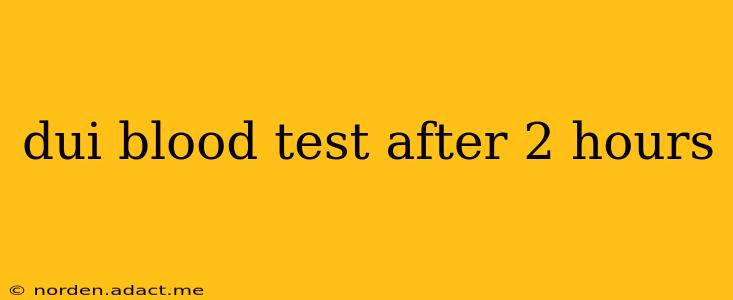A DUI (Driving Under the Influence) arrest often involves a blood alcohol content (BAC) test. The timing of this test, such as a blood test taken two hours after driving, is crucial in determining the legal consequences. This article explores the factors influencing BAC levels after two hours and the implications for DUI cases.
What is BAC and How Does it Change Over Time?
BAC, or blood alcohol concentration, measures the amount of alcohol in your bloodstream. It's expressed as a percentage—for example, a BAC of 0.08% means there are 0.08 grams of alcohol per 100 milliliters of blood. Legal limits vary by jurisdiction, but 0.08% is a common threshold for DUI charges.
BAC changes over time due to several factors:
- Alcohol Metabolism: Your body metabolizes alcohol at a relatively constant rate, typically around 0.015% per hour. However, this rate can vary based on individual factors like weight, gender, metabolism, and the presence of food in the stomach.
- Alcohol Consumption: The amount and type of alcohol consumed significantly impact BAC. A larger quantity of alcohol will naturally lead to a higher BAC, even after two hours.
- Time Since Consumption: The longer the time elapsed since the last drink, the lower the BAC is likely to be. This is because the body has had more time to process the alcohol.
- Individual Factors: As mentioned, individual factors such as weight, gender, and overall health can influence the rate of alcohol metabolism and consequently, the BAC reading after a two-hour period.
How Does a 2-Hour Delay Affect Blood Alcohol Test Results?
A two-hour delay between driving and the blood test provides a window for the body to metabolize some of the alcohol. This means that the BAC reading at the two-hour mark may be lower than the BAC at the time of driving. However, it doesn't necessarily mean the person was below the legal limit when driving. Experienced DUI lawyers and forensic toxicologists can utilize specialized techniques and formulas to extrapolate BAC levels back to the time of driving based on available evidence.
Can a Blood Test After 2 Hours Still Result in a DUI?
Absolutely. Even if the BAC at the two-hour mark is below the legal limit, it doesn't automatically exonerate the driver. Law enforcement and the prosecution can still build a case based on:
- Witness Testimony: Eyewitness accounts describing erratic driving behavior can be strong evidence, regardless of the BAC reading.
- Field Sobriety Tests: Results from field sobriety tests performed shortly after the driving incident can provide additional evidence of impairment.
- Other Evidence: Other evidence, such as dashcam footage or police reports, can corroborate the suspicion of impaired driving.
- Retrograde Extrapolation: Experts can use retrograde extrapolation—a process of calculating BAC at an earlier time based on later measurements—to estimate the BAC at the time of driving. This is frequently done in cases where there is a significant time delay between suspected driving under the influence and the blood draw.
What if My BAC Was Low After 2 Hours?
A low BAC reading after two hours doesn't guarantee a dismissal of charges. You should consult with a DUI attorney immediately. They can help review the circumstances of your arrest, analyze the evidence, and build a strong defense strategy.
How Accurate is a Blood Alcohol Test?
Blood alcohol tests are generally considered very accurate when properly administered and analyzed. However, there's always a margin of error involved in any test, and the chain of custody must be carefully documented to ensure the integrity of the sample.
What Should I Do If I'm Arrested for a DUI?
If arrested for DUI, remain calm, cooperate politely with law enforcement (but don't answer questions beyond providing your name and address), and contact a DUI attorney as soon as possible. Remember, anything you say can be used against you. An attorney can help you understand your rights and protect your interests throughout the legal process.
This information is for educational purposes only and should not be considered legal advice. Consult with a qualified legal professional for advice tailored to your specific situation.
